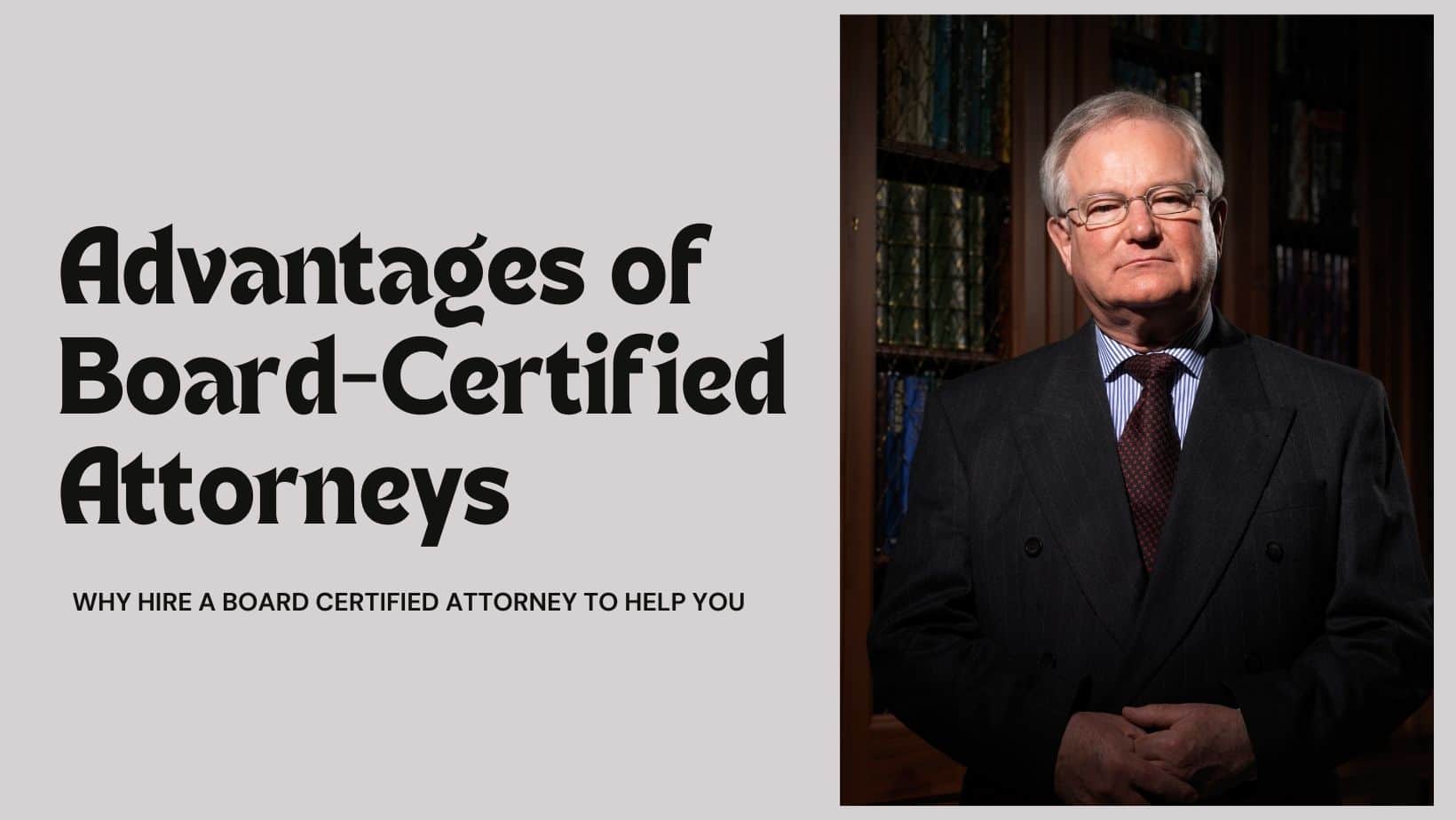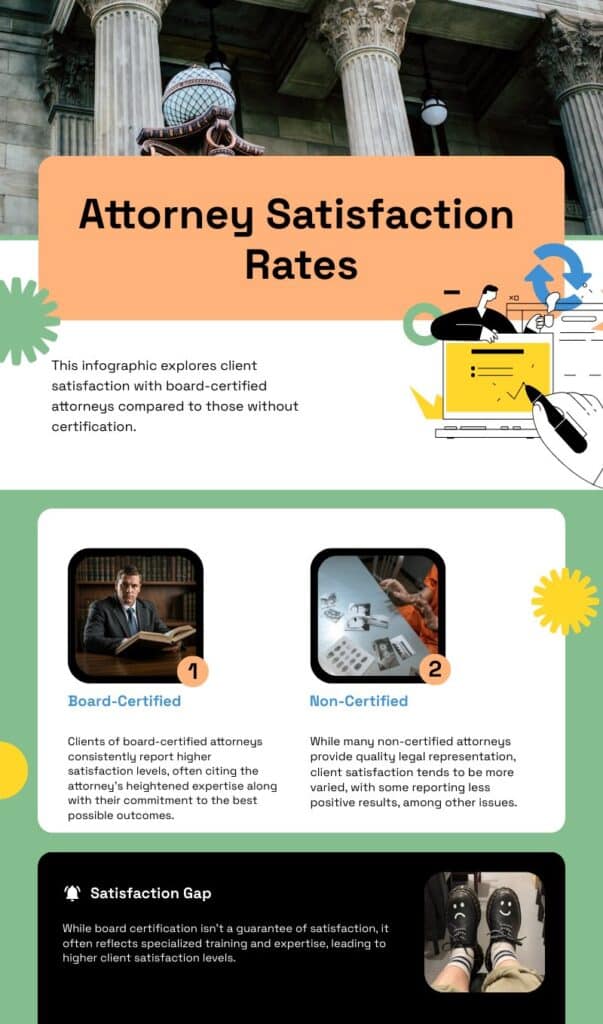
The Advantages of Using a Board-Certified Attorney
Posted on August 21, 2024 by Linda Black
I. Introduction
In today’s complex legal landscape, not all attorneys are created equal. While many lawyers provide excellent services, board-certified attorneys have demonstrated expertise in specific areas of law. This article will explore what board certification entails, the advantages of hiring a board-certified attorney, and specific situations where choosing one is crucial.
II. What is a Board-Certified Attorney?
A. Requirements for Board Certification
Board certification is a voluntary designation that attorneys can earn in specific practice areas. To become certified, attorneys must meet rigorous standards set by certifying boards like state bar associations or the National Board of Trial Advocacy. Requirements typically include:
- Years of Experience: Most certifications require a minimum of five years of practice, with a significant portion of that experience in the chosen specialty.
- Continuing Legal Education (CLE): Certified attorneys must complete additional training and education related to their area of law, staying current on the latest legal trends.
- Peer Reviews and Ethics Assessment: Many certifying boards require peer reviews to assess the attorney’s professionalism, ethics, and competency.
- Specialty Exam: To demonstrate their expertise, attorneys must pass a demanding exam specific to their area of law.
B. Practice Areas for Board Certification
While not every legal field offers board certification, several areas allow attorneys to earn this designation. The most common practice areas include:
- Civil Practice Advocacy
- Civil Trial Law
- Complex Litigation
- Criminal Trial Law
- Family Trial Law
- Immigration Law
- Patent Litigation
- Social Security Disability Law
- Truck Accident Law
III. Benefits of Choosing a Board-Certified Attorney
1. Proven Expertise in a Specialized Field
One of the primary benefits of choosing a board-certified attorney is their demonstrated expertise. Board-certified attorneys have proven that they possess deep knowledge and experience in their chosen field. Studies have shown that specialized legal representation often correlates with better outcomes for clients, particularly in high-stakes cases where nuanced legal knowledge is crucial.
2. Higher Standards of Legal Practice
Board-certified attorneys are held to higher ethical and professional standards than non-certified lawyers. The certification process requires attorneys to demonstrate not only their competence in the law but also their adherence to ethical standards. Regular recertification ensures they stay updated on legal developments and maintain a high level of professional conduct.
3. Increased Credibility and Trust
Certification enhances an attorney’s credibility. Clients, judges, and even opposing counsel often view board-certified attorneys as experts in their field, which can positively impact negotiations, settlements, and court proceedings. A client may feel more confident knowing their attorney is recognized as a specialist, especially in cases involving complex legal issues.
4. Commitment to Continued Education and Excellence
Certification boards typically require ongoing education to ensure that attorneys stay up-to-date with changes in the law. Board-certified attorneys are committed to continuous learning and excellence, which can directly benefit clients. For example, a family law attorney might stay informed on the latest regulations and case law, improving their ability to secure favorable outcomes for their clients.
5. Access to a Network of Resources
Board-certified attorneys often have access to a specialized network of peers and experts, which can be invaluable in building a strong case. This network can provide enhanced support, insights, and legal strategies, giving clients a significant advantage in their legal matters.

IV. Specific Scenarios Where a Board-Certified Attorney is Essential
A. Civil Practice Advocacy
When advocating for clients in civil disputes, board-certified attorneys can offer a distinct advantage due to their familiarity with specific procedural rules and substantive law. These cases often involve negotiation, mediation, and trial advocacy, where a certified attorney’s experience can result in better settlements or trial outcomes.
B. Civil Trial Law
In cases that proceed to trial, such as personal injury claims or contract disputes, a certified attorney can be critical. Board certification in civil trial law means the attorney has extensive experience litigating cases, which can be pivotal in obtaining favorable verdicts for clients.
C. Complex Litigation
Complex litigation often involves multiple parties, vast amounts of evidence, and intricate legal theories. Board-certified attorneys specializing in complex litigation are adept at managing large-scale cases, including class actions, mass torts, and corporate disputes. Their expertise helps clients navigate these multifaceted legal matters.
D. Criminal Trial Law
When facing criminal charges, having a board-certified attorney who specializes in criminal law can make a significant difference. Board certified criminal defense lawyers have honed their skills in defending clients against serious charges, often having a better grasp of procedural defenses and trial tactics.
E. Family Trial Law
Family law cases often involve emotionally charged issues such as child custody, divorce, and alimony. Board-certified family law attorneys are skilled at handling sensitive matters while ensuring their clients’ rights are protected. Their specialized knowledge of family court procedures and laws can greatly impact the resolution of these disputes.
F. Immigration Law
Immigration law is an ever-changing field with complex regulations and procedures. Board-certified immigration attorneys have gone through extra training through their education process are more well-versed in the latest legal developments, which can be crucial in helping clients navigate the immigration system, avoid deportation, or secure visas.
G. Patent Litigation
Patent disputes often involve intricate technical details and require a deep understanding of both law and science. Board-certified patent litigation attorneys are equipped to handle these complexities, providing clients with a strategic advantage in defending their intellectual property.
H. Social Security Disability Law
Social Security Disability cases can be notoriously difficult to win, particularly when dealing with appeals. Board-certified attorneys specializing in this field have the experience and knowledge necessary to navigate the bureaucracy of the Social Security Administration, increasing their clients’ chances of success.
I. Truck Accident Law
Truck accident cases differ significantly from regular car accidents due to the specific regulations governing the trucking industry. Board-certified truck accident lawyers understand these unique legal aspects and can better represent clients in securing compensation for injuries, lost wages, and damages.
V. How to Find and Verify a Board-Certified Attorney

A. Searching for Board-Certified Attorneys
Clients can search for board-certified attorneys through our Law Leaders specialized board-certified member attorneys directory. We have gathered a comprehensive list of board-certified attorneys throughout the United States, making it easy for you to find the right attorney for your legal needs.
B. Questions to Ask When Hiring
When interviewing an attorney, clients should ask about the attorney’s certification, experience in the relevant field, and specific cases similar to their own. Understanding how board certification aligns with their legal needs is crucial in making the right choice.
C. Verifying Certification
Clients can verify an attorney’s board certification through bar associations or certification boards’ online databases. Verification ensures the attorney’s credentials are current and valid.
VI. Potential Drawbacks and Considerations
A. Cost Considerations
Board-certified attorneys often charge higher fees due to their specialized knowledge and expertise. While this may be a drawback for some clients, the potential for more favorable outcomes can outweigh the additional costs in certain cases.
B. Availability and Accessibility
Board-certified attorneys may be less available, particularly in smaller regions or niche practice areas. However, clients seeking specialized representation may find it worthwhile to explore options beyond their immediate geographic area.
VII. In Summary
Board-certified attorneys offer numerous advantages, from proven expertise to increased credibility and access to specialized resources. While their services may come at a premium, the investment can make a significant difference in legal outcomes, particularly in complex or high-stakes cases. Clients should carefully weigh the benefits of certification when selecting legal representation.
References
- National Board of Trial Advocacy. “Why Certification Matters.” nbtalawyers.org.
- American Bar Association. “Board Certification: A Mark of Expertise.” americanbar.org.
- National Board of Legal Specialty Certification. “The Importance of Specialization in Legal Practice.” nblsc.us.
- Legal Information Institute, Cornell Law School. “Board Certification Requirements by State.” law.cornell.edu.
- Bureau of Labor Statistics. “How Specialization Affects Legal Representation.” bls.gov.
 1-800-LAW-Leaders (529-5323)
1-800-LAW-Leaders (529-5323)